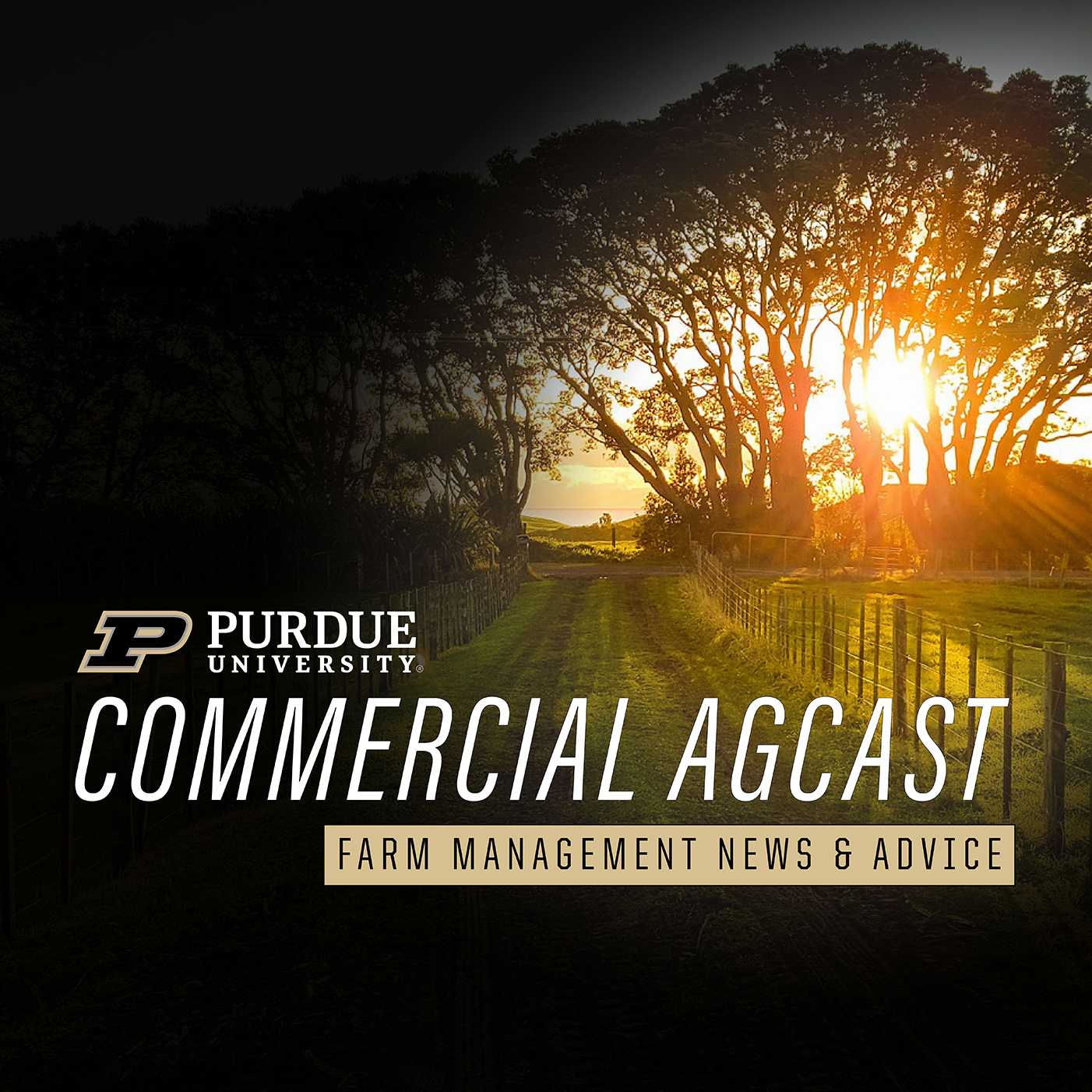June 4, 2022
Farm Succession: Exiting the Business In a Timely Manner
How soon should you start succession planning? What are important things to think about that need transferred? What makes a good business partner, and how can you make this decision?
On this episode, Purdue ag economist Brady Brewer discusses these succession planning questions along with tips on how to accomplish this transition in your farm business. Joining him in the discussion is the Purdue Farm Transition team, Dr. Maria Marshall, Director of the Purdue Institute of Family Business, and Renee Waitt, Farm Business Management Specialist, along with Denise Schroeder, Area Director and Extension Educator in White County.
A downloadable version of The Farm’s Legacy: A Guidebook for Intra-Family Succession is available here.
Audio Transcript
Brady Brewer: Hi. And welcome to the Purdue Commercial AgCast, the Purdue University Center for Commercial Agriculture’s podcast, featuring farm management news and information. On today’s episode, I’m your host, Brady Brewer, and I’m an associate professor here in the Department of Agricultural Economics. Joining me today is Maria Marshall, professor, and the Jim and Lois Ackerman Endowed Chair in Agricultural Economics.
Also joining me today is Renee Wiatt, a family business management specialist here in the Department of Agricultural Economics and the Purdue Institute for Family Business.
And Denise Schroeder, who’s an area director and extension educator in White County. So, I welcome all three of you.
On today’s episode, we’re going to be discussing why exiting the business or the farm business before the tombstone is important and some tips on how to accomplish this transition.
01:04
And before we get into this information, I just want to take a second to highlight that this is a part of a broader series on succession planning. So, for more information on succession planning, we advise all listeners to go to the Purdue Institute for Family Business website, which can be found at purdue.ag/fambiz.
You can also find the Purdue Institute for Family Business on Twitter and their Twitter handle is @PurdueFamBiz. You can also go to the Purdue Center for Commercial Agriculture website as there’s also material on succession planning at that website as well.
So, with that, let’s jump into our topic today of exiting the business before the tombstone. So, Maria, I’m going to pitch this first question to you.
Why don’t we want to exit the business at the tombstone?
2:03
Maria Marshall: Well, first, you might not have a business to pass on if you wait until the tombstone. That’s kind of the harshest implication is that for business to go on, it has to have managers and owners and people who know what’s going on. And when you wait too long to pass some of those things along then you’re not really passing on is a business entity in and of itself. You might be passing on assets.
And I think those are the big distinctions that we’re always trying to make is are you trying to just pass on assets or are you trying to pass on a business entity, which are two different things. Some implications of that are that if you’re just not even looking at just farm businesses, but small businesses in rural areas, you know, Main Street has a lot of baby boomers that have retired because of COVID and all these different things with no successor.
And so, if you think about exiting, you know, even before the tombstone or at the tombstone, a lot of those businesses would be shuttered if there’s no successor or nobody to take over. So those are the reasons why we’re like, well, it has to be before the tombstone so that you actually know that this business is going to be fruitful and move forward.
Brady Brewer: And I also expect there’s probably issues that arise in this transition period and, you know, exiting before this tombstone means that you can help solve some of those issues. Whereas if you exit after, it’s a little hard to solve those issues after the tombstone.
Maria Marshall: Right. And, you know, and some people say, well, you know, when at the tombstone, when I’m dead, it’s not my problem anymore. And they can fix their communication problems themselves. You know that or maybe they won’t. I mean, I think in some businesses, families, particularly some families, the incumbent generation might feel that they need to stay in order for that next generation to be able to communicate and that they’re the ones holding the glue together.
And so, then you have to think about, well, if you’re not there, is that business entity really going to survive if they need you there to make to be as a glue to bringing them together? So those are that, you know, the issues are usually around communication, not so much about these legal entities, which is what people want to talk about most yeah.
4:11
Brady Brewer: And that is the transferring of assets. So, Denise, I want to turn this next question to you. So, Maria mentioned this transfer of more than just assets, right? There’s a lot more to the succession plan that you need to think about in terms of transferring. So, what all does need transferred or what should we be thinking about the needs transferred to the next generation?
Denise Schroeder: Okay, well, when we’re thinking about the business continuing, we need to think about all kinds of things that need to be transferred. Who’s going to handle the finances, who’s going to handle the marketing? Especially if it’s a farm, who does the grain marketing? Is it all the senior generation that’s doing all these things, or are we slowly turning things over?
Who’s going to manage personnel? If there are more than just a couple of people involved in the operation and who’s going to handle the production? Okay, one of the things that I always say when we start transferring stuff is just because it’s not being done exactly the way that you did, it doesn’t mean it’s wrong. Okay, everybody has their own idea about how things should go and how we want to manage the people, the places, the things and everything.
And you know, the example I always give when we talk about this is really totally unrelated to farming. But I always say when my kids were young, I always ask them to fold the towels, okay, they didn’t fold in the way I wanted them folded, but guess what? They weren’t in the basket when I got home from work, and they were in the cabinet.
So, if the job’s getting done, we’re still having good production and everything, then, you know, we’re probably on the right path and we have to let go and help with this transition instead of stand in the way of it.
5:59
Brady Brewer: Yeah. And so, Denise, I think what I hear you say is that it’s okay to let them figure it out their own way. And maybe that leads to a teachable moment. So, they do it the way you want too later on.
Denise Schroeder: Very much so. And also, not only the teachable moment, but maybe, maybe they’ve got some different ideas about how things go. Maybe, maybe some of the ideas that they have maybe are actually better than the way that you’ve been doing it for the past 25 or 30 years.
Brady Brewer
Yeah. So, one thing that, you know, beyond passing the checkbook and the assets, there’s a lot of institutional knowledge that I hear you guys alluding to that, you know, maybe farmers are selling themselves short on is that, you know, there’s a lot of value in how we do things and maybe why we do things that needs passed on before the tombstone.
Denise Schroeder: Very much so. Some of the things that I think go as far as like relationships. What about landlord relationships? You know, some landlords like to be handled one way, other landlords, they just want their check and they’re just very much a silent landowner, and all they’re in it for really is the cash rent check. Others want to be more involved. Well, that stuff needs to be passed on to the next generation because as handling some landowners, sometimes you got to use some kid gloves and you need to know how they want to be handled, you know? So, it’s that personal relationship.
7:34
Brady Brewer: Yeah. Just like a salesperson hones their sales skills, you know, those communication skills with external party members are important as well. So, Denise has talked a lot about, you know, bringing in the next generation is more than just passing on the checkbook and the assets. There’s finance, marketing, personal production. But Renee, I want to ask you this next question. You know, that means that we have to choose a business partner to pass this on to. And sometimes there may be multiple people to pick. Sometimes it may be a group of people. So, this brings up the question to me, what makes a good business partner and how should we go about the decision of choosing who will be the next manager yeah.
Renee Wiatt: So, there’s a lot of things to consider when you think who’s going to take over the business. I mean, I think first in my mind, we’re talking about farm businesses here. You know, a lot of those farm businesses have a lot of family involved. USDA found that 98% of farms are family businesses. So, we’re dealing with family relationships we’re dealing with personal relationships.
We want to make sure that those bonds are still tight in the next generation. But we also want to look at our family realistically and say, who is willing and who is able to join the business. So, we want to kind of balance the ability and the willingness of those potential next generation, those next partners if you have somebody who’s interested and able, that’s your premiere pick, right? You want you want that person in the business. They’re going to have that fire. They’re going to have that drive they’re going to want to grow the business, continue the business, pass it on to their next generation. If someone’s interested but not able, those people are a little bit those are easier to train. You would rather have the interest, and the ability you can make up that gap. If somebody isn’t as able to do it, they can be trained, right?
That’s what we should do. Ideally in farm businesses, we should train that next generation. But if they’re not interested, sometimes those people need to find, maybe off farm jobs, find a different job, find a different niche within the business. Even they can maybe expand the farm in a different way. But we really need to look at our family realistically and say, who is a good fit and realize that not every single person in the family has to join the business or should join the business.
9:55
Brady Brewer: So, Renee, you know, there’s a lot of financial implications to this. And this sounds like it takes a long process to do. I’m going to guess the answer to my next question is not the day before the tombstone, but, you know, larger I want to know is how soon should businesses start to think about this transition? Is this something that is this five years, ten years out? Is this as soon as possible? What’s a good timeline for starting to think about this transition process?
Renee Wiatt: We always say plan early plan often. So, the earlier the better. I mean, at least having the discussion on an annual basis is great just to see who might be interested and things like that. But when you’re looking at the actual transition, you’re probably looking at about six years on average to transition the family. So, this process takes a long, long time.
That’s from the beginning of the transfer until you’re finished transferring that business. And so, five to ten years is great. That’s a good time for him to have. But always earlier and often when you’re when it comes to planning.
11:04
Brady Brewer: Yeah, and that’s six years on average, I assume you know, there’s farms that fall on end of that distribution, right? So, some take maybe longer than ten years to transition. That’s, that’s a long time to think about, you know, over a decade to execute this transition.
Renee Wiatt : Yeah. And when you think about the successor, you know, if they’re in this business and they’ve taken on a lot of these roles and they’re kind of in that limbo period where they don’t really know where they fit, they don’t know if they’re taking over or if they’re, you know, an employee or if they’re a manager, if they’re going to own some of the business, they can start to build resentment when those decisions aren’t made.
And so, timeliness is really a factor when it comes to succession and passing that business on. They need to be integrated in those discussions. They need to know what’s happening. They need to know the plan. And that should be communicated to everyone in the farm business. So that everyone’s on the same page and they know what to expect.
And when you have that timeline where you want to transfer the business, it also gives that senior generation a chance to pass on the knowledge, you know, the drive to be in that business to the next generation and to train them up and pass on those skills that are essential to the successor generation to be successful.
12:19
Maria Marshall: And that’s active succession process, right? That’s when you’re actually really starting so I would say if you’re really thinking about succession, it should be from when your kids are little, not that you’re trying to indoctrinate them, right? You’re passing on a lot of knowledge already, which is implicit, sometimes not explicit. In kind of the implicitness of like, I’m going to go back to the farm. You have the interest. You’re kind of cultivating competent owners, if not managers of that business from, you know, from a young age, growing farm businesses where everybody is involved at an early age. And in that six and a half to ten years is this kind of more active, an explicit succession process. So, this plan, a plan early, I’ve always said plan very early when you think about that way, way before the tombstone, right?
Because it’s about exiting the business gracefully in a way that you really have a successful business all around and cohesive family. So, it’s more than just this kind of active planning in the succession process.
13:24
Brady Brewer: Now, Maria, I want to follow up to that. Renee talked about, you know, hopefully you have someone that is interested and capable of taking over. What if you have multiple people? How do you choose a successor or successors? I should say, if you have multiple people in the family that want to be this manager. So, you know, let’s say hopefully you executed this process as early as possible, and you have either several children or relatives or other external party members that that are potential candidates and how do you go about choosing the right mix with multiple people in play?
Maria Marshall: Well, research says that if you have more than one kid, but you can only fit one, you delay it as long as possible. So, you don’t want to do that. I think what you have to do is figure out who has to be an owner, who has to be in manager, who are going to be both.
Right, because those are two different things. So, you might have two let’s say two children both of which are owners and part of that succession process, but only maybe one of them is an active manager. So really thinking about what roles will each play and that owners don’t necessarily have to be day to day managers or sometimes vice versa.
And so that’s one way to think about who is going to be your successor, and who’s really wants to be part of that business in an active way. And not just owning. A lot of times we get this thing that it’s okay if it’s a manager, it has to be an owner. If it’s an owner has to be a manager and that might not necessarily be true.
14:59
Brady Brewer: So, I want to ask it now a follow up question on you know, so we’re calling this exiting the business before the tombstone. I think the goal here is to exit long before you can have retirement or you know, Maria, I think you said exiting gracefully. And I really like that terminology there. What about retirement planning? How does this impact that process? You know, we talk about the financial goals of the successor taking over, but how does financial goals of the current owner factor into this?
Denise Schroeder: So, the generations really need to work together to make sure that we’re working towards both generations’ goals or them or multiple generations’ goals so that if the senior division wants to retire and gracefully exit the business, that they’re capable without the younger generation feeling like, oh man, there’s no way I’m going to be able to afford to keep this in business.
So there needs to be a lot of conversation and a lot of planning ahead of time, not just, oh, hey, by the way, I’m turning 65 next week. It’s your baby now.
16:11
Maria Marshall: And I think what we’ve seen is that farmers that have done financial planning for retirement are more able to exit gracefully and turn over more ownership to the next generation than farmers that don’t have those assets that for in terms of financial planning and require kind of land leases or require kind of an active farming portfolio to be able to retire, let’s say, just maybe not doing the labor work, but still need to keep hanging on to more of that ownership. So, it really does have serious financial implications for how that succession process is going to is going to work.
Brady Brewer: So, we’ve brought in a lot of different aspects here. You know, Denise mentioned finance goals or, you know, the transferring of finances, marketing duties, personnel duties, production duties, not to mention all the assets. It sounds like a pretty complicated process. Do we have a tool that can help families plan for all of these issues?
17:20
Renee Wiatt: So, we have a great tool, it’s called the road map. It lets farm businesses and any family business map out in what year they want to transfer, what parts of the business. So, whether it’s functional responsibility, whether it’s marketing responsibility, ownership, board governance, all of these things, you can really map it out per year. What generation is doing what in the business.
And if you can think about it, really the successor moves from successor or employee, and they move all the way over to where they’re the owner. They’re the CEO of that business. And this makes this makes the incumbent generation feel a lot better a lot of times, I think, when they see this. So, they move from that manager CEO, but maybe they move to a consultant role.
So maybe they’re still in the business consulting and helping that successor generation be successful. Then maybe they don’t have to be in the tractor or on the farm every day. Maybe they’re just called in to help give advice and help guide that business further. But we have a roadmap that is downloadable in our succession guidebook. It’s a great tool to use.
It’s free. It’s very straightforward. And everybody in the family can kind of map out what they think the succession process would look like. It’s great to have everybody kind of fill that out on their own and then bring them together and discuss where everybody would like to be and what year. I think its very eye opening to both generations sometimes, when they do that and compare those roadmaps.
18:55
Brady Brewer: And I’m going to assume Renee, that, you know, some of these steps, they don’t all have to happen in one year, right? They could be you transfer for transfer personnel duties or production duties, but the older generation is still doing the finances of the farm.
Renee Wiatt: Yeah, that’s exactly correct. And we have a version of the road map where you can fill in different responsibilities that you would like to fill in, so maybe landlord relationships. Denise brought that up. We’ve had other farmers bring that up and how imperative those relationships are to farm businesses. Maybe you want to start transitioning. Those are bringing in the other generation right now, start those relationships early.
You know, you can put that in as something to keep in mind and to be working towards. So, there’s all kinds of different responsibilities that you can put in that and really make this road map reflect your business.
19:45
Brady Brewer: Yes. And I do want to clarify, the guidebook that Renee just referenced is titled The Farm’s Legacy: A Guidebook for Intra-Family Succession, and it can be downloaded at the Purdue University education store, or we will also link to it on the Purdue Center for Commercial Agriculture’s website as well. And it is for free download. It does come with a number.
All the Purdue extension documents are numbered and its number, if you can’t find it by searching by the name is EC-817- W. And again, it is called The Farm’s Legacy: A Guidebook for Intra-Family Succession. I also want to point out that all these topics that we’ve talked today, you know, this podcast episode is a series on farm succession planning.
So, some of the you know, we didn’t get into conflict management and how exiting before the tombstone can impact conflict management or the financial goals or the estate planning goals or specifically, you know, the transferring of assets that Maria talked about. All those topics can be found if you search for the succession planning on the Commercial AgCast podcast app that you are using.
On behalf of the Center for Commercial Agriculture and the Purdue Institute for Family Business. I thank you for listening to this week’s episode.
TAGS:
TEAM LINKS:
RELATED RESOURCES
UPCOMING EVENTS
We are taking a short break, but please plan to join us at one of our future programs that is a little farther in the future.





